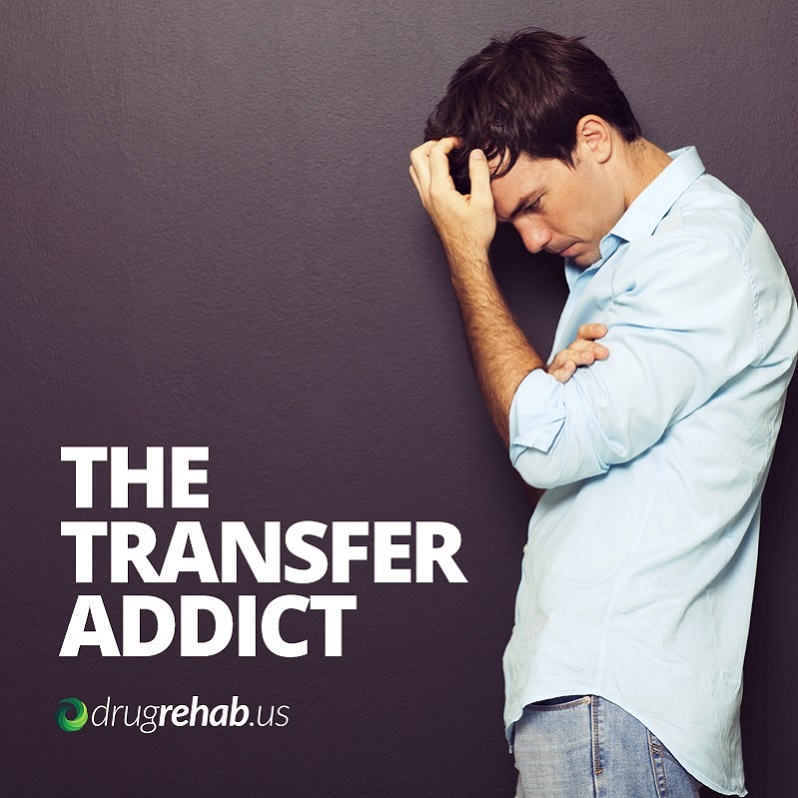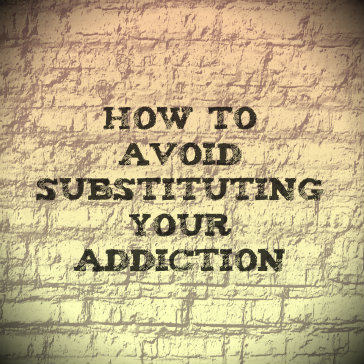24 Nov 2014
The Transfer Addict
There is an often-overlooked type of addict who struggles just as much as any other. She is unlikely to get help. She is unlikely to recognize her own problem or to have her loved ones see it in her. She is the transfer addict and she flies under the radar choosing one addiction, reining it in and gaining control and then moving on to the next one. She fools herself and those around her, but she is a true addict and she needs help.
Substitute Or Transfer Addictions
 Changing from one addictive substance or behavior to another is not uncommon for an addict. But most who engage in this behavior are obvious, at least to those around them if not to themselves.
Changing from one addictive substance or behavior to another is not uncommon for an addict. But most who engage in this behavior are obvious, at least to those around them if not to themselves.
Addicts in recovery are susceptible to developing a substitute addiction because they are trying to replace their compulsive urges with other activities. An addict might, for instance, start running as a healthy distraction from the urges to relapse.
Setting and achieving race goals and getting physically fit is a great way to stay sober, but an addict might turn this into an unhealthy obsession and develop a new addiction to exercise or running.
Another form of the transfer or substitute addiction is when an addict still in the throes of the disease thinks changing to a less serious substance means regaining control.
For instance, a cocaine addict might switch to marijuana use. This is a common way in which an addict transfers his high, but it is simply the substitute of one substance for another and does not represent control over an addiction.
The Low-Flying Transfer Addict
While substitute addictions are not uncommon, there is another type of addict that flies low and under the radar. This addict has one unhealthy obsession, maybe drinking too much, but she is able to get it under control before it becomes a full and serious addiction.
She assures her friends and family that, yes, she probably drinks more than is good for her, but she has it under control. She does this, not by recognizing her obsessive behaviors, but by transferring them to something new.
She stops drinking and starts obsessing over food. She binge eats and starts gaining weight. Before long she is overweight, but decides to rein it in and get it under control. She assures everyone she is well by changing her diet and starting an exercise regime. She loses the weight, but now she is addicted to working out and meeting that next exercise goal.
This transfer addict may never let herself reach the level of full-blown addiction to one substance or behavior, but she displays all the compulsions of an addict. Her compulsive behaviors evolve and change, but she never copes with them. They never go away.
Breaking The Cycle Of Transfer Addiction
If the description of a transfer addict sounds familiar to you, it’s time to break the cycle. Whether it’s you or someone you know, transfer addictions need to stop in order to build a healthy lifestyle.
Addiction of any type has no cure, but it can be managed successfully. Whether this means getting professional help or using self-education and self-control to resist urges, you or your loved one can stop the destructive cycle of transfer addictions.
If you do try to go it alone, be aware that you might fail. If you can’t seem to control your behaviors and urges, don’t get discouraged. It just means that you need the assistance of an experienced professional.
Call Us Now For Help Overcoming Your Substance Or Behavioral Addiction – We Are Here For You!
27 Jan 2014
How to Avoid Substituting Your Addiction
A substitute addiction is a substance, activity or behavior that replaces a previous addiction. Acquiring a substitute addiction is not uncommon for those in recovery from drug or alcohol dependence. Being an addict takes up the biggest portion of your life.
When you are addicted to drugs or alcohol, you obsess over getting more, you earn money just so you can buy more, you try to hide your habit, and you fight with loved ones about it. In other words, addiction takes over your life. When it is gone, it may feel like you have a void in your life that needs filling. It is possible to fill that hole with positive activities and healthy relationships, but if you’re not careful, you may just slip into another addiction.
Are Substitute Addictions Always Bad?
 For some addicts in recovery, a substitute addiction may start out as a healthy new activity. Maybe you have taken up an exercise regimen, or you have started going to church again. Perhaps you are ready to devote yourself to your job and to getting a promotion. None of these are bad ideas, but they can become unhealthy obsessions and even approach the level of a behavioral addiction if you do not monitor your behaviors.
For some addicts in recovery, a substitute addiction may start out as a healthy new activity. Maybe you have taken up an exercise regimen, or you have started going to church again. Perhaps you are ready to devote yourself to your job and to getting a promotion. None of these are bad ideas, but they can become unhealthy obsessions and even approach the level of a behavioral addiction if you do not monitor your behaviors.
Not all addicts will develop these substitute addictions, but it is possible. There are underlying reasons you became an addict in the first place. These reasons may cause you to take up a new obsession when the first one has gone away. It is important that you find new ways to expend your energy after getting sober, but be aware of the possibility of a substitute addiction and remember that moderation is key.
How Can You Recognize A Substitute Addiction?
Because many of these substitute addictions start out as a healthy and positive new activity, it can be tough to tell when you are approaching a level of unhealthy obsession. If you became clean from prescription drugs, and then turn to drinking alcohol, the presence of a substitute addiction is obvious. Becoming obsessed with exercise or work is less so.
Listen to your loved ones and your support network. If people who care about you are telling you that you are becoming obsessed with your new hobby, you should listen. It is often easier to recognize a substitute addiction in someone else than it is to see it in yourself.
Be aware of your feelings and your motivations. If you went through a good rehab program, you learned to be aware of why you became an addict and how addiction changed your emotions and moods. If you notice similar feelings and motivations in your new hobbies or activities, it’s time to rethink what you’re doing.
How To Strike A Balance In Sobriety
Just because substitute addictions are a possibility in your new, sober life does not mean that you should not get involved in new activities. To avoid obsessing or developing a replacement for your addiction, learn to be more balanced. Instead of getting heavily involved in one activity, try several. Spread yourself out and try a lot of new things. You can always whittle your new activities down to two or three, but don’t allow all of your time to be taken up by just one.
Make sure your new activities don’t get in the way of the responsibilities you have. Make sure you keep time set aside for your relationships, your chores, and anything else you need to do. Let your loved ones help you through this process. With their support you can learn to be balanced and healthy while staying free of any kind of addiction.


